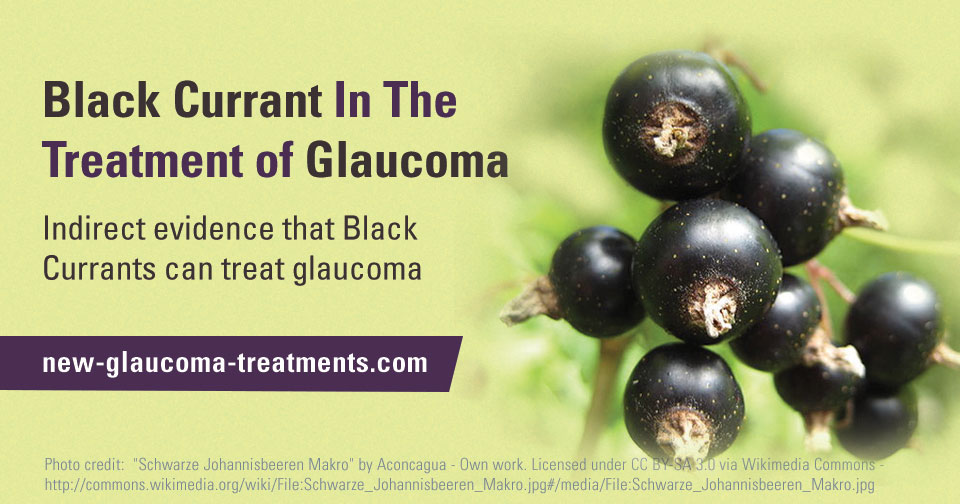
Black Currant – A Natural Source of Quercetin
What is Black Currant?
Black Currant (Ribes nigrum) is a shrub that produces dark purple berries. Black currant berries contain anthocyanidins. Anthocyanidins are common pigments found in plants.
Evidence that Black Currant can be effective in the treatment of Glaucoma
There is no direct evidence that consuming Black Currants or its extracts can treat glaucoma. However, evidence suggests that consumption of Black Currents can increase blood levels of Quercetin.[1] Any benefit to those with glaucoma is likely due to the neuroprotective and trabecular meshwork protective actions of Quercetin.
Potential Side Effects and Risks:
Black Currant berries, juice, flowers, and leaves are generally recognized as safe (GRAS) by the FDA.[2]
Potential Drug Interactions
Anti-Hypertensive Medications
Black Current seed oil may result in a lowering of blood pressure.[3] In people whose blood pressure is not well-controlled this could be a good thing. However, care should be taken when used along with other blood-pressure lowering medications such as captopril (Capoten), enalapril (Vasotec), losartan (Cozaar), valsartan (Diovan), diltiazem (Cardizem), amlodipine (Norvasc), hydrochlorothiazide (HydroDIURIL), furosemide (Lasix), as well as many others.
Blood Thinners
Black Currant contains gamma-linolenic acid (GLA), which may have an antiplatelet (”blood thinning”) effect.[4] As such, Black Current should be used with caution in those who are also taking known blood thinners such as aspirin, clopidogrel (Plavix), dalteparin (Fragmin), enoxaparin (Lovenox), heparin, ticlopidine (Ticlid), and warfarin (Coumadin).
Recommended Dosage
No human glaucoma studies have been done looking at the role of Black Currant in the treatment of glaucoma. Therefore, it is not known what dose, if any, would provide a benefit to those with glaucoma. However, it would be reasonable for those who are neither diabetic nor taking blood thinners to add Black Currant berries to their diet.
References
[1] Erlund I, Marniemi J, Hakala P, et al. Consumption of black currants, lingonberries and bilberries increases serum quercetin concentrations. Eur J Clin Nutr 2003;57:37-42.
[2] Electronic Code of Federal Regulations. Title 21. Part 182 — Substances Generally Recognized As Safe. Available at: http://ecfr.gpoaccess.gov/cgi/t/text/text-idx?c=ecfr&sid= 786bafc6f6343634fbf79fcdca7061e1&rgn=div5&view= text&node=21:3.0.1.1.13&idno=21
[3] Deferne, J. L. and Leeds, A. R. Resting blood pressure and cardiovascular reactivity to mental arithmetic in mild hypertensive males supplemented with blackcurrant seed oil. J.Hum.Hypertens. 1996;10(8):531-537.
[4] Guivernau M, Meza N, Barja P, Roman O. Clinical and experimental study on the long-term effect of dietary gamma-linolenic acid on plasma lipids, platelet aggregation, thromboxane formation, and prostacyclin production. Prostaglandins Leukot Essent Fatty Acids 1994;51:311-6.
Don’t delay getting checked for glaucoma.
Make an appointment with an eye doctor in your area now. If you live in the greater Los Angeles area and would like Dr. Richardson to evaluate your eyes for glaucoma call 626-289-7856 now. No referral required. Appointments are available, Tuesday through Saturday.


